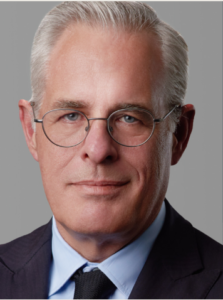By Amanda Leonard || Copy Editor

Jerry Taylor’s Common Hour talk on November 8th illustrated that deeply-rooted and seemingly eternal values can change.
Taylor spent most of his life firmly on the right side of the political spectrum: working under GOP senator Chuck Grassley after college and eventually landing a position at the Cato Institute, a libertarian think tank where he spent twenty-three years arguing against climate change action on television and in op-eds for major news outlets.
When he was assigned to energy and environmental policy at Cato, he did not have any prior experience in this sector. He acknowledged that the narratives he heard on climate change while growing up were a so-called “apocalyptic forecast,” in which fear that the planet was being destroyed was everywhere. Still, he spent those Cato years being “…absolutely convinced that the arguments for putting some temper on climate change action were very strong.”
One of the pivotal moments that eventually led to Taylor’s shift in perspective was during a television debate in which his opponent called out his misrepresentation of a climatology study. Taylor asserted that the warming that had taken place over time was much less than the study had projected, but he had only discussed the phase that was conducted before a set of emission regulations was passed, and that the second phase yielded results that have been almost spot-on since 1988.
After taking this story back to Cato and faced with denial of the truth and dodging around the facts, he began to realize that he could no longer trust the information of the climate-skeptic community, and that he had made the mistake of ingesting and automatically believing the face-value narratives.
Taylor then moved on to addressing the argument that if climate change were to be taken seriously, it would ultimately lead to deindustrialization and the demise of capitalism.
He spent ample amounts of time searching for economists outside of Cato that would affirm this position, and ultimately could not find any reputable academics who would offer any solid reasoning as to why climate action shouldn’t happen. Taylor also acknowledged that he had a hard time finding any libertarians in his circle that would address the moral or ethical implications as well.
Despite the ample amount of scientific proof that climate change is legitimate, Taylor acknowledged that there is still denial: denial that results from three main reasons that are just as deeply-rooted as his former strict libertarian beliefs.
The first he described is a notion called “motivating cognition,” in which conservatives and libertarians “[use] all reasoning and intellectual ability to believe what they want to believe,” thereby distancing themselves from all perspectives from the left. If they adopted leftist ideas about what climate policy should look like, it would involve significant government intervention and thereby derail deep-seated libertarian values. Taylor also acknowledges that most people fill their social circles with people who agree with them, because approval from friends ultimately gives one more personal utility than “being right.” Finally, Taylor highlights the importance messages from “political champions:” what your go-to news source or favorite political commentator has to say about a certain issue is likely what you will believe.
Taylor wrapped up by summarizing the overall purpose of his talk. “I wanted to give you an idea of what climate skepticism really looks like, why I believe it falls short, and it turns out why I think it is that the case for climate action might be even stronger than you realize.”
First-year Amanda Leonard is the Copy Editor. Her email is aleonar1@fandm.edu.